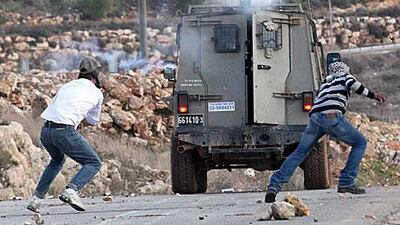NABI SALEH, WEST BANK // Three days ago, Mustafa Tamimi joined family, friends and activists in this tiny West Bank village to protest Israel's military occupation, just as he has done almost every week for two years.
On Saturday, he was dead.
A tear-gas canister fired by an Israeli soldier hit the 28-year-old Palestinian man in the head during Friday's demonstration, according to dozens of witnesses.
His death has inflamed family and friends in his native Nabi Saleh, whose 550 residents began demonstrations two years ago against the expansion of a Jewish settlement on their land.
For them, this is more than just another example of the Israeli military's tough response to their protests, which usually consists of mass arrests, rubber bullets and substantial amounts of tear gas.
"They deliberately shot him in the face!" Mustafa's 51-year-old uncle, who was at Friday's protest, said. He was too scared to give his name.
Israel's military is investigating Mustafa's death. It said an initial examination "indicates that a Palestinian was severely injured from a gas grenade shot towards him".
The military said in a statement yesterday Friday's demonstration was a violent and illegal riot of 100 people throwing rocks. Israel said soldiers found a slingshot on Mustafa's body. Even if rocks were thrown, that is beside the point, activists say.
"The question is not whether the person is throwing stones or not throwing stones; the question is whether the army is allowed to use deadly force from within an armoured vehicle," Jonathan Pollak, a pro-Palestinian Israeli activist who supports Nabi Saleh's demonstrations, told the Associated Press soon after the shooting.
"This violates the army's own regulations."
Soldiers are banned from aiming tear gas grenades directly at protesters. A photograph (right) from the demonstrations appears to show that is what happened.
It captures Mustafa chasing after an armoured military vehicle a few metres ahead, as someone sitting inside fires at his head.
"A soldier took his gun out and shot him directly," said the photographer who took it, Haim Schwarczenberg, another Israeli activist.
Posters of Mustafa's bloodied face were plastered across the village yesterday as family, friends and supporters hoisted his body, draped in a Palestinian flag, through the streets.
They called it a martyr's funeral. His family wailed, calling his name. Several women fainted.
"We're never going to stop our protests because Mustafa's blood, our blood, is for Palestine!" said one of his relatives, Marwan Tamimi, 41.
Scores of residents, while still vowing peaceful demonstrations, also displayed to journalists the wounds they sustained at rallies against Israel's occupation.
Old men to young women showed scars from what they said were tear gas canisters and rubber bullets. One man had an oversized bandage on his forehead.
Some spoke about the trauma inside Israeli prisons, where more than 10 per cent of the village has spent time, including Mustafa and his four brothers.
Manal Tamimi, 39, Mustafa's cousin, said Mustafa recently started building a new home in the village so he could settle down and marry. A high school graduate, he was a bus driver.
"He had somebody in mind," she said of his prospective fiance. "But you know our culture: you don't know who she is until he, the man, is ready to propose."
Instead, mourners yesterday raised his body in front of his unfinished home and chanted.
"Our martyr, oh Mustafa, the martyr of Palestine!"
Follow
The National
on
& Hugh Naylor on

